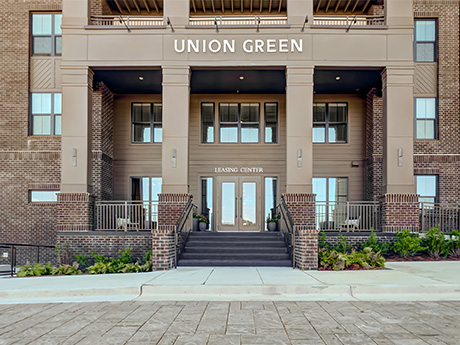Five years after the world shut down, the national multifamily market is still on a roller coaster ride. After the highs of 2021 quickly turned into the lows of 2023, the dust settled in 2024. Today, the market has begun to reactivate while continuing to grapple with the aftereffects of the run-up.

While national multifamily transactions soared 22 percent in 2024, Atlanta transaction volume was flat year-over-year as the investment community shifted a favorable view of Atlanta toward ambivalence. Perceptions surrounding new supply and non-paying tenants contributed to the city falling out of vogue with some investors, but Atlanta is a resilient market.
With new deliveries having peaked in 2024 and property-level fundamentals rapidly turning the corner, Atlanta may be beaten up, but the light at the end of the tunnel is coming into focus: Atlanta is still a long-term winner.
Days of peak supply are over
While Atlanta experienced a record 24,000 units delivered in 2024, that figure represents just 4 percent of its total inventory. When compared to other Sun Belt markets like Charlotte (10 percent of total inventory delivered in 2024), Nashville (8 percent) and Dallas (5 percent), the number doesn’t seem as jarring.
Looking ahead to 2025, infill Atlanta’s construction pipeline has decreased 34.4 percent year-over-year, while suburban Atlanta’s construction pipeline has decreased 20.5 percent year-over-year. Axiometrics is currently projecting 6,500 units to be delivered in 2026 in Atlanta — the market’s lowest annual amount since 2014. This dramatic decline sets the market up for an impending boon to property performance and positions it for outperformance versus other major metros.
Fundamentals turning
Coming off back-to-back years of double-digit rent growth in 2022, it would’ve been unimaginable to think that Atlanta would then trudge through two years of negative rent growth. The market posted a 1.7 percent decline in 2023 followed by a 4.4 percent decline in 2024, primarily due to the supply wave and softening market fundamentals. As the rate of new deliveries rapidly shrinks, Axiometrics and CoStar Group are projecting positive rent growth for 2025, marking a sharp reversal to a two-year slide in rents.
Atlanta posted a 0.9 percent rent growth increase quarter-over-quarter in first-quarter 2025, which is the largest increase in seven consecutive quarters, according to CoStar. Furthermore, Atlanta’s absorption of 25,500 units in 2024 is the highest on record, a positive trend that should aid demand as homeownership continues to outpace the expense of renting. The average new mortgage payment is $3,006, a 38 percent premium to the average national monthly rent of $2,176.
Making the market
Analyzing market participants reveals a great deal about what cycle stage a market is in. Last year, institutions re-entered the market on a large scale in Atlanta. Known as the least “risk on” investor profile, institutions generally step back when a market becomes frothy and re-enter when it begins to stabilize on the macro and property levels. In Atlanta, institutions represented 55 percent of all buyers in 2024, according to CBRE. This is significantly higher than the 2024 national average of 36 percent, indicating that Atlanta is close to stabilization.
An economic powerhouse
In the post-recession period of 2010 to 2019, Atlanta established itself as an economic powerhouse, producing an average of 64,000 jobs per year, according to the U.S. Bureau of Labor Statistics. On a percentage basis, Atlanta nearly doubled the national average employment growth during that period.
This ongoing trend was, and will continue to be, a key pillar of every investment thesis behind multifamily purchases in Atlanta. With the Federal Reserve’s economic tightening agenda in place, national job growth has considerably slowed, but Atlanta is still projected to outperform. The Atlanta Regional Commission (ARC) forecasted that 840,000 jobs will be added to Atlanta over the next 30 years.
Recent headlines speak to the continued belief and investment in Atlanta, even in a tempered national job market. Northside Hospital Gwinnett is nearing completion on a $400 million, 15-story tower that will generate more than 5,000 new jobs.
In January 2025, Amazon announced a new $11 billion investment to build multiple data center campuses across Atlanta that are expected to create thousands of jobs. In February 2025, Duracell announced the relocation of its national research-and-development headquarters to Midtown’s Science Square Labs. The innovation hub is adjacent to Georgia Tech and is expected to bring over 100 jobs to the market.
A rebalanced supply pipeline, improving property fundamentals and a resilient economic engine combine to form a strong multifamily investment thesis for Atlanta. Like many other markets, Atlanta struggled with the aftermath of the post-COVID low-interest rate frenzy, but it’s set up for a rebound in both values and performance.
Institutions are back in the market providing more liquidity, and investors that had the foresight to purchase assets in 2023 and 2024 will be rewarded in the next cycle for their belief that while a little beat up, Atlanta is a long-term winner.
— By Shea Campbell, vice chairman and managing director, Multifamily Capital Markets – Southeastern U.S., CBRE. This article was originally published in the May 2025 issue of Southeast Real Estate Business.


